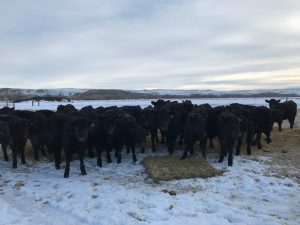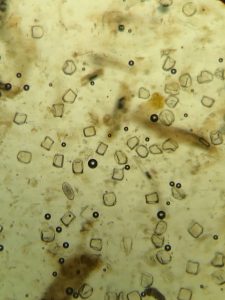Unusual Parasites Cause Death In Replacement Heifers
It has been a hard winter for replacement heifer calves. We have seen a number of deaths in 700 lb weight calves over the last month.
Most of these calves were home-raised replacement heifers and cut-back steer calves that were being backgrounded at home.
While respiratory disease was implicated in all of the cases (based on autopsies and lab samples), we found some surprising results in the fecal samples. Parasites were at the root of all of the disease and death that we were seeing in these cases.
It wasn’t just any parasite though. Two very unique parasites were affecting these herds: Nematodirus and Tape worms.
Neither of these parasites tend to cause problems in cattle over 2 years old. But they can wreak absolute havoc on young stock.
Also, they are not killed by traditional dewormers like Ivermectin or Dectomaxx. Both worms can be killed by the oral white wormers (like Valbezan). And certain pour ons such as Cydectin and Eprinex can kill the Nematodirus (but not tapeworms).
Within 24 hours of treating their 700 weight calves for these parasites, these producers reported that their calves were entirely different animals (bucking, playing, eating).
Most surprising of all, was that most of these calves were fat and healthy with beautiful hair coats. They showed none of the symptoms of parasitism.
What does this mean for your herd?
Run fecals! We have a special fecal centrifuge at our clinic designed specifically to isolate parasites. Our veterinarians and licensed technicians can tell you if your poop looks clean in a matter of a few hours.
How To: Collect fresh feces in a ziplock bag. Label with the ear tag number. Drop off at our clinic within 24 hours (keep in fridge if posssible). Take 5 samples from your replacement heifers. Take 1-3 samples from your bulls. Take 1-3 samples from your coming 3 year olds.
If a critter dies, have her autopsied within 24 hours!! Don’t wait for a second animal to die before you decide to pursue diagnostics.
Autopsies almost always give you answers. More often than not, its not the answer that you expected.
Vaccine protocols and deworming protocols can then be adjusted accordingly.
Nematodirus worms produce a distinctive, large, football-shaped egg. You can see how much larger the nematodirus eggs are in this slide vs. the other “normal” sized stomach worms.
Tapeworm eggs are about 1/3 of the size of nematodirus. 
Call The Sugar Factory Vet Clinic if you have any questions regarding your herd!



